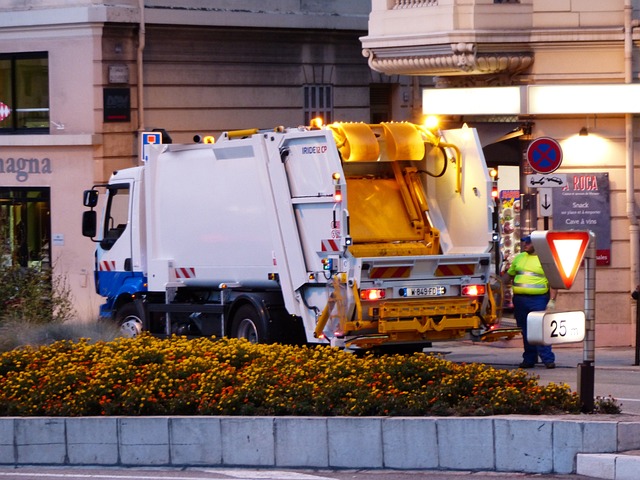The text emphasizes the importance of proper grout care, highlighting its porous nature and susceptibility to dirt, stains, and mold. It contrasts traditional grout cleaners' toxic chemicals with natural alternatives like baking soda, vinegar, lemon juice, and essential oils. These methods not only promote healthier living spaces but also extend grout lifespan, reduce environmental impact, and offer cost savings. Specific cleaning techniques, such as using a baking soda and vinegar paste or lemon juice solution, are detailed for effective stain removal while preserving tile finishes. Regular cleaning with these natural solutions ensures grout stays fresh and inhibits bacteria growth.
Tired of seeing your tiled floors obscured by unsightly, stained grout? Traditional grout cleaning products often contain harsh chemicals that can be damaging to both your health and the environment. Fortunately, there’s a greener way forward with natural solutions for cleaning dirty grout. This guide explores effective, non-toxic methods using essential oils, baking soda, vinegar, lemon juice, and plant-based alternatives. Learn how to restore the sparkle to your floors while maintaining a healthy home environment. Discover DIY tips and tricks for achieving pristine grout without resorting to toxic cleaners.
Understanding Grout and Why It Needs Cleaning

Grout, the material that fills the spaces between tiles in your floor or walls, is often overlooked when it comes to cleaning. However, it’s a crucial component that can accumulate dirt, stains, and even mold over time. Understanding grout’s composition is key to effective cleaning. It’s typically made from cement, sand, and water, which makes it porous and prone to absorbing moisture and debris. This porosity also means that traditional cleaning methods can leave residue or damage the grout if not done carefully.
Regular cleaning is essential to maintain the aesthetics and longevity of your grout. Natural solutions for cleaning dirty grout offer a healthy alternative to harsh chemicals, preventing damage while effectively removing stains and buildup. By opting for natural methods, you create a safer environment without sacrificing cleanliness, ensuring your space remains vibrant and fresh-looking.
The Problem with Traditional Grout Cleaning Products

Many traditional grout cleaning products contain toxic chemicals that can be harmful if inhaled or come into contact with skin. These harsh substances often leave behind residue and odors, posing health risks to occupants of the space, especially in homes with children and pets. The chemical compositions used in conventional grout cleaners can also damage natural stone and tile surfaces over time, diminishing their aesthetic appeal and requiring more frequent replacement.
In contrast, seeking natural solutions for cleaning dirty grout offers a safer and environmentally friendly alternative. Natural ingredients like baking soda, vinegar, and lemon juice are effective at cutting through grease, grime, and stains without the use of toxic chemicals. These methods not only ensure a healthier living environment but also prolong the lifespan of your grout and flooring, making them a sustainable choice for maintenance and cleaning.
Benefits of Natural, Non-Toxic Solutions

Using natural, non-toxic solutions for cleaning dirty grout offers a multitude of benefits. Firstly, it ensures that no harmful chemicals are introduced into your living spaces, making it safer for both you and your family, especially if there are children or pets around. Secondly, these solutions are often more environmentally friendly, reducing the risk of pollution and preserving our planet’s resources. Natural grout cleaners can be just as effective as their synthetic counterparts, breaking down grime and restoring the gleam to your tiles without leaving behind any toxic residue.
Moreover, opting for natural solutions can lead to improved air quality indoors, as these products typically have fewer volatile organic compounds (VOCs) that can irritate respiratory systems. They are also often more cost-effective in the long run since they don’t require frequent replacement and can be easily made at home using common household ingredients. This eco-friendly approach not only benefits your health but also contributes to a sustainable lifestyle.
Essential Oils for Removing Stains and Discoloration

When it comes to non-toxic grout cleaning, essential oils offer a powerful and natural solution for removing stains and discoloration. These concentrated plant extracts are renowned for their antimicrobial and deodorizing properties, making them ideal for freshening up your grout without harsh chemicals. Lemon oil, for instance, is a popular choice due to its ability to cut through grease and grime, leaving your grout sparkling clean. Tea tree oil is another powerful ally, known for its anti-fungal and antibacterial qualities, which can help prevent future stains from taking hold.
Incorporating essential oils into your grout cleaning routine is simple. You can mix a few drops of your chosen oil with warm water and apply the solution directly to the affected areas. Let it sit for a few minutes to allow the oil’s properties to work their magic, then wipe away any residue with a soft cloth or sponge. This natural approach not only cleans effectively but also adds a refreshing scent to your space, making grout cleaning a more enjoyable task.
Baking Soda and Vinegar: A Powerful Duo

Baking soda and vinegar are two common household items that create a powerful cleaning duo for grout. This natural solution is an effective and eco-friendly way to tackle dirty grout lines in your home. When combined, baking soda and vinegar produce a fizzing reaction, acting as a gentle yet powerful cleaner. The baking soda helps to abrade and lift dirt and stains from the grout, while vinegar’s acidity cuts through grease, grime, and mineral deposits. This simple mixture is a game-changer for maintaining fresh-looking tiles and grout without the use of harsh chemicals.
As a natural solution for cleaning dirty grout, this combination offers a cost-effective and safe alternative to store-bought grout cleaners. It’s easy to make, requiring only these two ingredients and water. Plus, it’s versatile—you can adjust the ratio of baking soda to vinegar based on the level of grime or specific stains you’re targeting. This DIY approach not only saves money but also minimizes exposure to potentially harmful chemicals, making it ideal for those with sensitive skin or who prefer a more sustainable cleaning routine.
Lemon Juice: Nature's Bleaching Agent

Lemon juice is a powerful natural solution for cleaning dirty grout, offering an eco-friendly alternative to toxic chemicals. Its acidic nature acts as a gentle bleach, effectively lifting stains and discoloration from grout lines. This simple, affordable ingredient can be easily squeezed from fresh lemons and mixed with water to create a safe and effective cleaning solution.
Unlike commercial grout cleaners, lemon juice is non-corrosive and safe for use on various surfaces, including ceramic and stone tiles. Its natural properties make it an excellent choice for those seeking natural solutions for cleaning dirty grout while avoiding harsh chemicals that can damage or fade tile finishes.
Exploring Plant-Based Cleaning Alternatives

In the quest for non-toxic grout cleaning, exploring natural solutions has emerged as a popular and effective approach. Traditional grout cleaners often contain harsh chemicals that can be detrimental to both your health and the environment. As such, many are now turning to plant-based alternatives—a safer and more eco-friendly option. These natural solutions harness the power of botanicals, offering powerful yet gentle cleaning action without leaving behind toxic residue.
Plant-based cleaners, derived from fruits, vegetables, and herbs, provide an excellent alternative for maintaining pristine grout while ensuring a healthy living space. Ingredients like lemon juice, baking soda, and vinegar are well-known natural cleaners that can effectively dissolve dirt and grime without the need for synthetic chemicals. Their versatility allows for easy homemade cleaning solutions tailored to specific grout issues, making it a popular choice among eco-conscious consumers seeking natural solutions for cleaning dirty grout.
DIY Grout Cleaning Tips and Tricks

Keep your grout lines fresh and pristine with these DIY grout cleaning tips using natural solutions. Start by sprinkling baking soda over the stained grout, creating a paste by adding a few drops of white vinegar. This mixture is a gentle yet effective scrubber. Using an old toothbrush, gently scrub away dirt and grime, rinsing frequently. For tougher stains, create a solution with equal parts water and lemon juice, dip a cloth in the mix, and wipe down the grout lines. The acid in lemons naturally cuts through grease and grime without harsh chemicals.
Once cleaned, rinse thoroughly with warm water to remove any residue, and dry with a microfiber towel. These simple, natural solutions for cleaning dirty grout not only save you money but also ensure your home remains fresh and free from toxic residues.
Maintaining Clean and Healthy Grout

Keeping grout clean and healthy is an ongoing process, but with the right natural solutions, it can be a simple and effective task. Regular cleaning is essential to prevent dirt and grime buildup, which can not only make your tiles look less appealing but also create a breeding ground for bacteria. Start by sweeping or vacuuming the floor to remove any loose debris. Then, use a mixture of warm water and a natural cleaner like baking soda or vinegar. This simple yet effective solution can tackle everyday stains without harsh chemicals.
For more stubborn marks, consider creating a paste from baking soda and water. Apply it directly on the stained grout and let it sit for about 15 minutes before scrubbing gently with an old toothbrush. Rinse thoroughly and dry the area to reveal refreshed, clean grout lines. Regular maintenance and these natural solutions will ensure your grout stays in top condition, enhancing the overall look of your tiled spaces.
